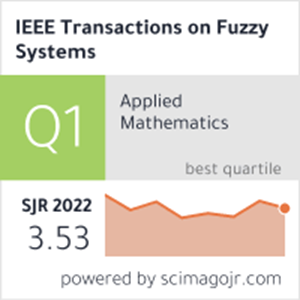Fuzzy Kernel Stochastic Configuration Networks for Industrial Data Modeling
IF 11.9
1区 计算机科学
Q1 COMPUTER SCIENCE, ARTIFICIAL INTELLIGENCE
引用次数: 0
Abstract
Kernel stochastic configuration networks (KSCNs) belong to the randomized learner model with universal approximation property. However, the original KSCNs model lacks logical reasoning ability and the utilization of prior knowledge. This article proposes a novel neurofuzzy learner model based on KSCNs, termed fuzzy KSCNs (F-KSCNs), for enhancing model’s interpretability and modeling performance. First, the Takagi–Sugeno–Kang fuzzy inference system is integrated into the modeling process of KSCNs, where multiple submodels are constructed according to the associated fuzzy rules. Then, the parameters of F-KSCNs are determined by the kernel stochastic configuration algorithm to guarantee model’s universal approximation property. Finally, the output of F-KSCNs is obtained by comprehensively evaluating the significance of each submodel. Compared to the original KSCNs, the proposed F-KSCNs have stronger fuzzy inference ability and can deal with rule-based information. Moreover, computational efficiency is greatly improved under this fuzzy inference framework. Two industrial case studies are carried out for performance evaluation. The experimental results with comparisons with existing solutions clearly show the superiorities of our proposed method, including generalization performance and modeling efficiency.工业数据建模的模糊核随机组态网络
核随机配置网络(KSCNs)是一种具有普遍逼近性质的随机学习模型。然而,原有的KSCNs模型缺乏逻辑推理能力和对先验知识的利用。本文提出了一种基于KSCNs的神经模糊学习模型,称为模糊KSCNs (F-KSCNs),以提高模型的可解释性和建模性能。首先,将Takagi-Sugeno-Kang模糊推理系统集成到kscn的建模过程中,根据关联的模糊规则构建多个子模型。然后,利用核随机组态算法确定f - kscn的参数,以保证模型的普遍逼近性。最后,综合评价各子模型的显著性,得到f - kscn的输出。与原有的KSCNs相比,本文提出的F-KSCNs具有更强的模糊推理能力,能够处理基于规则的信息。在此模糊推理框架下,计算效率大大提高。为评价业绩进行了两个工业案例研究。实验结果与已有解的对比表明,本文方法在泛化性能和建模效率方面具有明显的优越性。
本文章由计算机程序翻译,如有差异,请以英文原文为准。
求助全文
约1分钟内获得全文
求助全文
来源期刊

IEEE Transactions on Fuzzy Systems
工程技术-工程:电子与电气
CiteScore
20.50
自引率
13.40%
发文量
517
审稿时长
3.0 months
期刊介绍:
The IEEE Transactions on Fuzzy Systems is a scholarly journal that focuses on the theory, design, and application of fuzzy systems. It aims to publish high-quality technical papers that contribute significant technical knowledge and exploratory developments in the field of fuzzy systems. The journal particularly emphasizes engineering systems and scientific applications. In addition to research articles, the Transactions also includes a letters section featuring current information, comments, and rebuttals related to published papers.
 求助内容:
求助内容: 应助结果提醒方式:
应助结果提醒方式:


